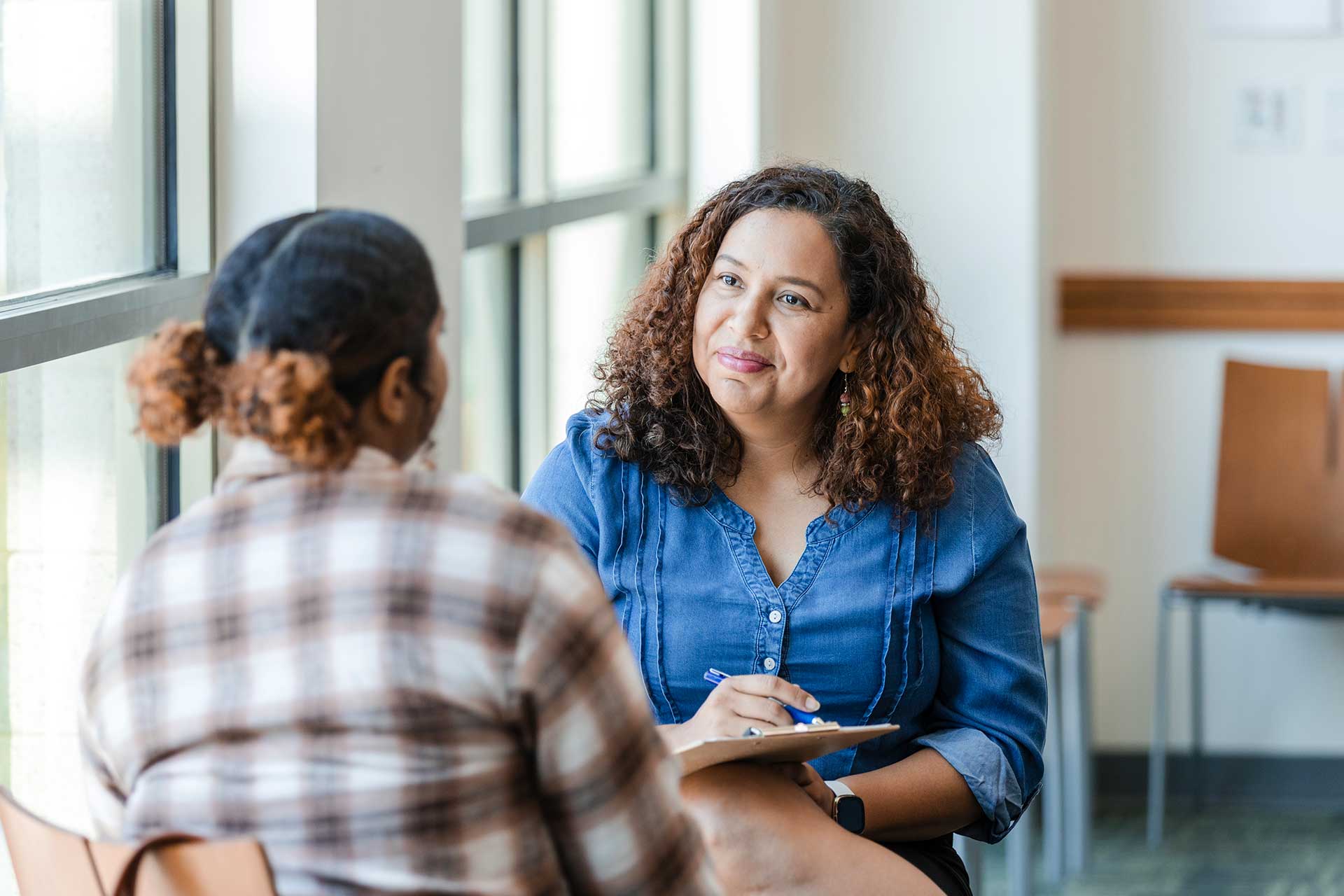The Role of Mental Health Counselors in Underserved Communities
| 6 Min Read

Millions of people in the U.S. are affected by mental illness. Every year, 1 in 5 adults experience mental illness, and 1 in 6 youth ages 6-17 experience a mental health disorder.1 According to the National Alliance on Mental Illness, it’s essential to understand the physical, social, and financial impact of these challenges on individuals and communities across the nation.
While behavioral health professionals such as mental health counselors play an essential role in every community by working to meet the needs of individuals and groups of all ages, access to mental health services can be more challenging to come by for some populations. Despite the fact that 75 percent of Americans believe mental health is just as important as physical health,2 underserved communities often experience barriers to receiving the care they need.
Mental health counselors can directly impact this critical need by better understanding these populations, intentionally choosing to work in underserved areas, and providing effective, inclusive care.
What is an Underserved Community?
The Department of Health and Human Services (HHS) defines underserved populations3 as individuals who share one or more of the following characteristics:
- Have limited access to health care services
- Encounter economic, cultural, and/or linguistic barriers to accessing primary health care services
- Have a lack of familiarity with the health care delivery system
- Face a shortage of readily available providers
While considered a separate category, vulnerable communities often overlap with underserved communities. Vulnerable individuals are those who experience additional barriers to receiving care,3 including:
- Children
- Indigenous populations
- LGBTQIA+ individuals
- Low-income or unhoused individuals
- Older adults
- People with physical or intellectual disabilities or cognitive, hearing speech, and/or vision impairments
- Pregnant women
- Racial and ethnic minorities
- Rural populations
- Victims of abuse or trauma
Barriers to Mental Health Care
People from vulnerable and underserved communities often encounter barriers to accessing mental health services. They can experience lower-quality care due to factors like implicit bias and lack of culturally sensitive providers. In addition, rural and lower-income communities may have fewer behavioral health providers available in their local area.2
Another barrier experienced by underserved and vulnerable populations is the cost of care. Poor insurance coverage and high out-of-pocket costs for behavioral health services can prevent those in need from receiving the care they require. In the US, mental health services are more than five times as likely to be charged out-of-network rates by insurance companies than physical health services, and in-network provider reimbursement is 20 percent higher for primary care than mental health visits.4
While many of these barriers are grounded in systemic issues that must be addressed with policy changes from the top down, understanding the challenges vulnerable and underserved individuals encounter can help mental health counselors better serve these populations.
How Mental Health Counselors Help Underserved Communities
There are many ways that mental health counselors can positively impact underserved and vulnerable communities. These methods involve strategies to improve care quality, access, and outcomes.
Counselors are uniquely positioned to make a direct difference in the lives of individuals, families, and groups. Their work at the community level, including outreach efforts and development of community programming, can also create opportunities for improvement on a larger scale.
Butler University’s master’s in mental health counseling program prepares graduates to help underserved communities through approaches like the following:
Advocating for Community Mental Health Services
Counselors can become change agents in their communities by promoting their clients’ needs and shared interests. Counseling work often requires collaboration with government agencies and community outreach programs. These connections provide opportunities to advocate for improving or expanding mental health services, identifying and correcting inequitable policies, and increasing behavioral health funding.5
Providing Trauma-Informed Care
Members of underserved or vulnerable populations may have experienced trauma in their lives. For this reason, counselors must be able to identify trauma responses, screen for trauma symptoms, and provide treatment that incorporates effective, trauma-informed approaches.6
Offering Telehealth Options
Access to behavioral health providers is among the most challenging barriers underserved and vulnerable communities face. During and after the COVID-19 pandemic, many states expanded their telehealth laws. These policy changes offered patients more equitable access to counseling and behavioral health services.7 Counselors who can provide telehealth services open doors to individuals who may not have providers in their local area, those without reliable transportation, and more.
Providing Culturally Informed Counseling
Counselors need to approach treatment with cultural awareness when working with clients from diverse backgrounds. This involves incorporating information about a client’s cultural identity and lived experience into treatment approaches, assessing policies and practices to ensure equity, and resolving cultural or language barriers through services like free language assistance.8
Reducing Costs by Offering a Sliding Scale
For individuals who struggle to afford the out-of-pocket costs of behavioral health services, a sliding scale option can be the difference between receiving care and going without. Counselors offering a sliding scale can designate a certain number of appointments for lower-income clients. Cost is at the counselor’s discretion but could be determined by income, insurance coverage, or other factors that impact an individual’s ability to pay.
Become a Licensed Mental Health Counselor with Butler University
If you want to pursue a rewarding, in-demand career in counseling, Butler’s online Master of Science in Mental Health Counseling can help you reach your goals in three years or less.
This flexible, hands-on program offers a fully online curriculum designed to prepare you for dual mental health counseling and clinical addictions counseling licensure in Indiana.9 Though licensure requirements vary by state, the MS in Mental Health Counseling aligns with national and state standards. Students are encouraged to contact their state license board to determine if this program will work for them.
Butler’s MHC program is grounded in evidence-based learning. It uses a theory-to-practice model to prepare you for counseling roles in clinics, schools, addiction and recovery organizations, hospitals and more. Through a 100-hour practicum and 600-hour internship, you will gain the practical experience you need while meeting the requirements for licensure. You will also learn from a faculty of skilled practitioners who are subject matter experts and bring valuable insights to the classroom.
Learn more about what a Butler degree can mean for your career as a mental health counselor.
Sources
- National Alliance on Mental Illness. Mental Health By the Numbers. Retrieved Oct. 2024, from https://www.nami.org/about-mental-illness/mental-health-by-the-numbers/.
- National Council on Mental Wellbeing. Study Reveals Lack of Access as Root Cause for Mental Health Crisis in America. Retrieved Oct. 2024, from https://www.thenationalcouncil.org/news/lack-of-access-root-cause-mental-health-crisis-in-america/.
- U.S. Department of Health and Human Services. Serving Vulnerable and Underserved Populations. Retrieved Oct. 2024, from https://www.hhs.gov/guidance/sites/default/files/hhs-guidance-documents/006_Serving_Vulnerable_and_Underserved_Populations.pdf.
- The White House. Reducing the Economic Burden of Unmet Mental Health Needs. Retrieved Oct. 2024, from https://www.whitehouse.gov/cea/written-materials/2022/05/31/reducing-the-economic-burden-of-unmet-mental-health-needs/.
- Psychology Today. Behavioral Health Professionals as Community Advocates. Retrieved Oct. 2024, from https://www.psychologytoday.com/us/blog/outside-the-box/202201/behavioral-health-professionals-community-advocates.
- American Counseling Association: Counseling Today. The counselor’s role in community outreach and resiliency building. Retrieved Oct. 2024, from https://www.counseling.org/publications/counseling-today-magazine/article-archive/article/legacy/the-counselors-role-in-community-outreach-and-resiliency-building.
- National Library of Medicine. Shaver J. The State of Telehealth Before and After the COVID-19 Pandemic. Retrieved Oct. 2024, from https://pmc.ncbi.nlm.nih.gov/articles/PMC9035352/.
- National Alliance on Mental Illness. Identity and Cultural Dimensions. Retrieved Oct. 2024, from https://www.nami.org/your-journey/identity-and-cultural-dimensions/.
- Indiana Professional Licensing Agency. Behavioral Health and Human Services Licensing Information. Retrieved Oct. 2024, from https://www.in.gov/pla/professions/behavioral-health-and-human-services/behavioral-health-and-human-services-licensing-information/.

